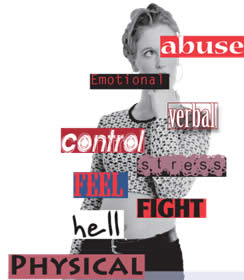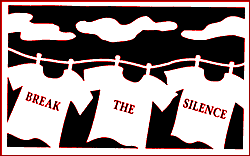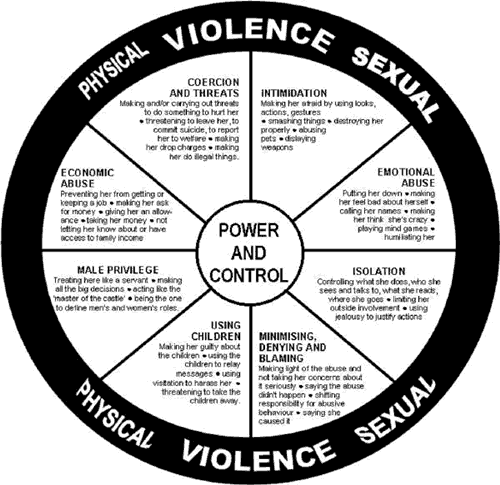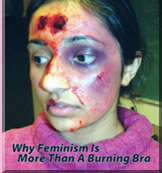 |
||||||
Third Rail Editorial:
Break the Silence
 A burning bra was a fine and relevant symbol for feminism circa 1965. Interestingly enough, it was also at about this time that spousal abuse finally became a crime and not just a “private matter.” Unfortunately, while the burning bra has run its course and done its job, or if not, at least lost any shock value and therefore power it ever had, the dramatic but all too real images of women who have been beaten by their intimate partners have not.
A burning bra was a fine and relevant symbol for feminism circa 1965. Interestingly enough, it was also at about this time that spousal abuse finally became a crime and not just a “private matter.” Unfortunately, while the burning bra has run its course and done its job, or if not, at least lost any shock value and therefore power it ever had, the dramatic but all too real images of women who have been beaten by their intimate partners have not.
I say this from experience. I am a victim not only of spousal abuse but also of spousal rape. My ex-husband would regularly beat me, call me names, cheat on me, and make me feel even more worthless than I did when I met him. He left bruises that people saw but ignored. He would punch holes in the walls of my house; we would pretend not to notice them. Even my family with whom we lived pretended not to notice what was happening. They probably did that to spare me the embarrassment of the situation, but I could have used their help and support to get out!
The sad fact is that I am far from alone. Women are socially programmed to endure these brutalities silently, sometimes even believing that the attacks are signs that their men truly love them! Others are too ashamed to ask for help. Instead, they accept their boyfriend or husbands’ rules, control and abuse as punishment for being women. What can a burning bra do for them? They need someone to reach out to them, to tell them that this is not their lot in life and to show them that there is a way out. Perhaps pictures that show that others are getting out will help them see that it can go too far, especially since the first blow is already a quick start.
 The media sends mixed messages. Part of the problem is that domestic violence has only been a crime for about forty years. Many of our most cherished TV icons were from before that time and they show that it was common and acceptable for a man to hit and/or threaten his wife. Ricky would often spank Lucy, and to this day, Ralph Kramden’s “To the moon, Alice” is one of the most quoted lines in television history. Doesn’t anybody realize that when he says this he is threatening to punch her?
The media sends mixed messages. Part of the problem is that domestic violence has only been a crime for about forty years. Many of our most cherished TV icons were from before that time and they show that it was common and acceptable for a man to hit and/or threaten his wife. Ricky would often spank Lucy, and to this day, Ralph Kramden’s “To the moon, Alice” is one of the most quoted lines in television history. Doesn’t anybody realize that when he says this he is threatening to punch her?
Thankfully, we are seeing stronger women to set these examples. One of them became a sort of role-model for me. Bret Butler’s character, Grace Kelly from Grace Under Fire, was a survivor of domestic violence who had thrown her abusive husband out. For this, she suffered the ridicule of her former mother-in-law who simply refused to accept the truth - the pain of her children who didn’t know or understand what was going on - and the scars that the years she had spent in this marriage had put on her own psyche. But through it all she managed to thrive. She raised her children to be better people and followed her passion for writing to a college degree-the first in her family. Finally, a woman who had been through all of this and lived to do more than just tell the tale.
The main problem in the way society views domestic violence and other crimes against women like rape is that they are crimes of power - men’s power over women - and that it is socially normal for men to have power over women. Until that view changes, every woman, all of our mothers, sisters and even daughters, are in danger. How can society protect us from these dangers if it acts as if it approves of their causes?
The best way to fight this problem, and so many other social evils like it, is education. Just as parents can teach their children not to be racist, they can teach their children not to be sexist. This means much more than just telling our daughters that “you can grow up to be anything” or that “you are just as good as the boys.” Girls ARE just as good as boys, but that isn’t entirely the point. I have been teaching my own daughter that she is as good if not better that any boy since she was born.
The problem is that boosting the confidence levels in our daughters is just not enough. We need to teach our sons that girls are not objects; they are not servants, they are not targets and when they say “no” to sexual contact of any kind, the answer is NO. Nor are they so weak and fragile that their only place is on a pedestal. Girls and boys are both people, nothing more and nothing less. They need to be judged with the same set of standards, allowed to participate in the same activities, and allowed to play with the same toys. If we, as parents and as a society (remember, after all, that it takes a village), do our jobs properly, they will understand this.
Now, once again, the media weighs in. How can I show my six-year-old daughter how to be a strong woman who can accomplish anything when every toy marketed toward her tells her that her place is to sit home, cook meals, raise children and look perfect while doing it? I know that this is not a new revelation, but I started taking it a bit more seriously when, at the tender age of six, she’s telling me that she’s fat and that nobody likes her. If this is her level of self-esteem now and with her parents doing all they can to build her up, what will she do if a boy she likes starts to tear her down?
It doesn’t end with toys. Even children’s programming does nothing to dissuade the image that men are in charge and that women just serve them. Additionally, the media deems it safe to market products primarily aimed at boys to both sexes and show women assuming roles once held only by men, but still demonstrates constantly that it is wholly inappropriate for a man to step into a traditional woman’s role. Just look at the situation in ABC’s new hit drama Commander in Chief. This show depicts the trials and tribulations of the first female American president. It is interesting to note, however, that there seem to be more gender-based difficulties for her husband, the First Gentleman. If this is the way our children learn to socialize, no change will come.
This is not to say that the media is responsible for what happened in my or anyone else’s marriage. Nothing in the mentioned programs or advertising supported violence toward women, but the message that men are in charge of women in possible tandem with violence or aggression in his upbringing will almost definitely set the stage for what so many women endure in an abusive marriage.
If the media is guilty of anything in the battle to end domestic violence, it’s being nearly silent on the matter. Although it has improved in recent years, it has not gone nearly far enough. Young girls need to see that this is not the way that they should be treated. The media especially shows that young women are likely to watch and emulate women on shows like The OC and Gilmore Girls. A strong female character like Buffy was good, but how about a woman just as strong, but a bit more realistic? As I said before, Grace did me a lot of good, and I doubt I was the only victim that Brett Butler’s character helped get her life back in order. Reaching the survivors is wonderful, but the failure to use the media as a preventative tool is tragic.
I have talked a bit on what has influenced my daughter, but she also has the benefit of a father who firmly believes in an equal relationship. He often bears the brunt of my past and does so with all of the gentleness and understanding that he knows I need-unless he feels that it is influencing how his daughter views relationships. In her presence, he makes certain that she sees us interacting as a loving couple. If we do argue in front of her, he is careful to allow her to see only a discussion more closely resembling a debate than a fight.
My ex-husband and I have a child together also—a son. He saw nothing but wars. His psyche was wounded by the feeling that he was a failure because he was unable to protect the mother whose job it was to protect him. Adding to this was his confusion because the danger he was trying to shield me from was his own father. This is a common result of domestic violence and has even been recognized as a contributing or risk factor leading to various forms of mental illness, including depression and oppositional defiance disorder (ODD). ODD is a disorder much like bipolar disorder, but involves problems with authority and anger control.
Symptoms to look for include a child or teen who is: hostile; negative; defiant; oppositional; pessimistic; aggressive; argumentative; angry; resentful; has a low frustration level; accusatory; unreasonable; blaming; spiteful; vindictive; bad tempered and foul-mouthed. Now that I’ve described my son to you, let me take away the “that is just how teenagers are” comment by stating that my son was hospitalized because of ODD three times-the first when he was nine. My son turned ten as an inpatient in a pediatric psych ward.
Spousal abuse clearly affects more than just the women whose husbands are abusing them, and many peopleseem to agree that society, as a whole, needs to help them. Yet society places so much value on this, that an internet search for battered women’s shelters determined that there is only one on Staten Island (run by Safe Horizon 800.621.HOPE [4673]). A similar search found five animal shelters on Staten Island. If there is ever really going to be an end to the horrors of domestic violence we need to learn that women are more important than animals. More importantly, society needs to reexamine the messages it sends to our children. Maybe then they can be saved from ever going through this.

